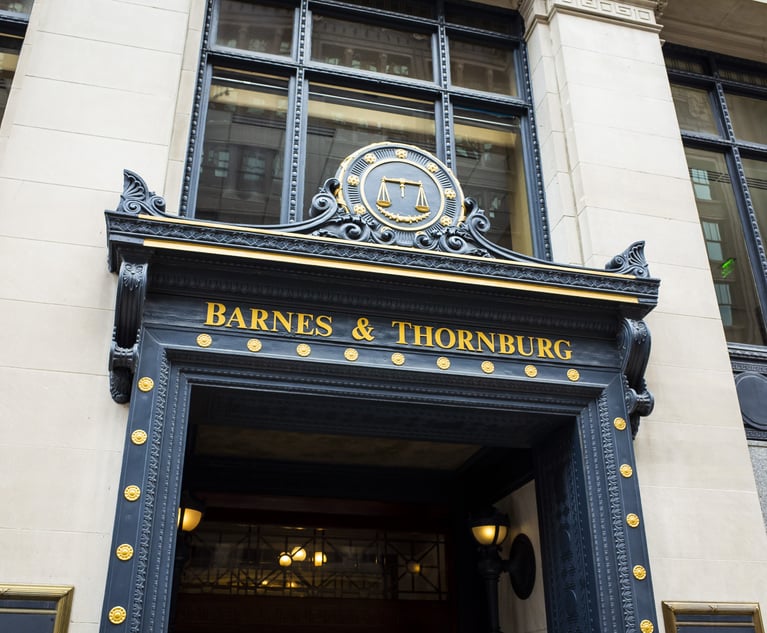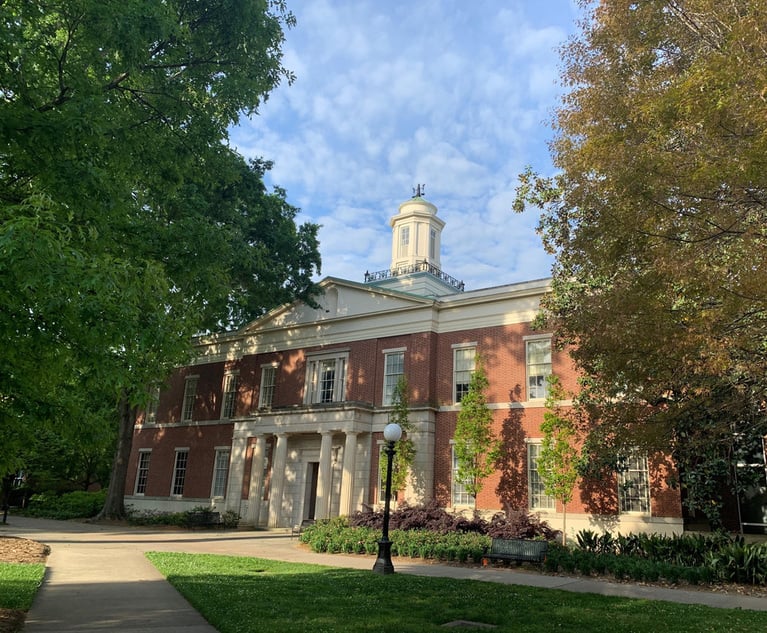Georgia Justice Project Honors Delta for Criminal Records Restriction Work
Delta Air Lines CLO Peter Carter received the nonprofit's annual Grassroots Justice Award at the Delta Flight Museum for his law department's work helping restrict criminal records that block Georgians from employment and housing.
May 13, 2019 at 04:30 PM
4 minute read
 Peter Carter, chief legal officer, Delta Air Lines. (Photo: John Disney/ALM)
Peter Carter, chief legal officer, Delta Air Lines. (Photo: John Disney/ALM)
The Georgia Justice Project presented its annual Grass Roots Justice Award to Delta Air Lines chief legal officer Peter Carter and Delta's law department on Thursday evening for their help in restricting criminal records that block the nonprofit's clients from obtaining jobs, housing and education.
Georgia has the highest rate of criminal record-holders in the country, said the Georgia Justice Project's board chair, Dentons partner Dan Beale. He said 40% of Georgians have a criminal record, and 1 out of 18 Georgians is under correctional control.
New laws passed under former Gov. Nathan Deal's administration expanded eligibility for criminal records restriction to people with nonconvictions and first offenders, even though Georgia still has some of the most strict laws in the country.
Last year, Delta's law department made its pro bono focus the Georgia Justice Project's Criminal Records Clinic, which Beale called the group's fastest-growing initiative.
When members of the legal department proposed Georgia Justice Project for their pro bono focus, “I was so thrilled,” said Carter, the Delta chief legal officer.
“Equal justice under the law is one of the bedrock principles of our nation,” he said, adding that the Georgia Justice Project's work contributes to that.
Debbie Brown, a Delta assistant general counsel, said that she was surprised to find out during training how strict Georgia's criminal records laws are, and she learned quickly how high-stakes the work is for Georgia Justice Project clients.
“A criminal record follows them everywhere—when they apply for jobs, housing and benefits,” Brown said. One client she helped, she said, turned to Georgia Justice Project after a two-decade-old misdemeanor record resurfaced during a job search.
The woman had worked in a clothing store in her early 20s when some of her friends came in and stole $50 worth of clothing. The woman did not try to stop them, Brown said, and the company pressed charges against her for theft by deception, resulting in one year of probation, a $300 fine and $50.68 in restitution.
The client went on to a successful 22-year career at AT&T and raised a family. Then she was laid off and applied to become an Uber driver. Uber denied her application after unearthing the old charge.
Brown said her client's court petition to have her record restricted and sealed was granted, clearing the path for her to find employment. “There are thousands like her, though, whose misdemeanor criminal record continues to haunt them,” she said.
“This was the most rewarding volunteer legal case I've ever done,” Brown added, in her 30-year career in the Delta legal department.
Carter, Delta's chief legal officer, accepted the Georgia Justice Project award at a benefit for the group held at the Delta Flight Museum in Atlanta, surrounded by a jumbo jet and earlier plane models now on display in a repurposed hangar.
The Georgia Justice Project was founded in 1986 with the unique mission of providing legal and social services, plus employment support, to indigent people who've been accused of a crime or are returning from jail or prison.
The group has grown from four lawyers to a 26-person staff that includes social workers who offer counseling, job training and referrals, thanks to the Woodruff Foundation and support from a plethora of law firms and corporate legal departments like Delta's.
Other big supporters include: Alston & Bird, Georgia-Pacific, The Home Depot, King & Spalding, Bondurant, Mixson & Elmore, Dentons and Eversheds Sutherland.
This content has been archived. It is available through our partners, LexisNexis® and Bloomberg Law.
To view this content, please continue to their sites.
Not a Lexis Subscriber?
Subscribe Now
Not a Bloomberg Law Subscriber?
Subscribe Now
NOT FOR REPRINT
© 2025 ALM Global, LLC, All Rights Reserved. Request academic re-use from www.copyright.com. All other uses, submit a request to [email protected]. For more information visit Asset & Logo Licensing.
You Might Like
View All
On The Move: Squire Patton Boggs, Akerman Among Four Firms Adding Atlanta Partners
7 minute read

Georgia Justices Urged to Revive Malpractice Suit Against Retired Barnes & Thornburg Atty
4 minute read
Trending Stories
- 1States Accuse Trump of Thwarting Court's Funding Restoration Order
- 2Microsoft Becomes Latest Tech Company to Face Claims of Stealing Marketing Commissions From Influencers
- 3Coral Gables Attorney Busted for Stalking Lawyer
- 4Trump's DOJ Delays Releasing Jan. 6 FBI Agents List Under Consent Order
- 5Securities Report Says That 2024 Settlements Passed a Total of $5.2B
Who Got The Work
J. Brugh Lower of Gibbons has entered an appearance for industrial equipment supplier Devco Corporation in a pending trademark infringement lawsuit. The suit, accusing the defendant of selling knock-off Graco products, was filed Dec. 18 in New Jersey District Court by Rivkin Radler on behalf of Graco Inc. and Graco Minnesota. The case, assigned to U.S. District Judge Zahid N. Quraishi, is 3:24-cv-11294, Graco Inc. et al v. Devco Corporation.
Who Got The Work
Rebecca Maller-Stein and Kent A. Yalowitz of Arnold & Porter Kaye Scholer have entered their appearances for Hanaco Venture Capital and its executives, Lior Prosor and David Frankel, in a pending securities lawsuit. The action, filed on Dec. 24 in New York Southern District Court by Zell, Aron & Co. on behalf of Goldeneye Advisors, accuses the defendants of negligently and fraudulently managing the plaintiff's $1 million investment. The case, assigned to U.S. District Judge Vernon S. Broderick, is 1:24-cv-09918, Goldeneye Advisors, LLC v. Hanaco Venture Capital, Ltd. et al.
Who Got The Work
Attorneys from A&O Shearman has stepped in as defense counsel for Toronto-Dominion Bank and other defendants in a pending securities class action. The suit, filed Dec. 11 in New York Southern District Court by Bleichmar Fonti & Auld, accuses the defendants of concealing the bank's 'pervasive' deficiencies in regards to its compliance with the Bank Secrecy Act and the quality of its anti-money laundering controls. The case, assigned to U.S. District Judge Arun Subramanian, is 1:24-cv-09445, Gonzalez v. The Toronto-Dominion Bank et al.
Who Got The Work
Crown Castle International, a Pennsylvania company providing shared communications infrastructure, has turned to Luke D. Wolf of Gordon Rees Scully Mansukhani to fend off a pending breach-of-contract lawsuit. The court action, filed Nov. 25 in Michigan Eastern District Court by Hooper Hathaway PC on behalf of The Town Residences LLC, accuses Crown Castle of failing to transfer approximately $30,000 in utility payments from T-Mobile in breach of a roof-top lease and assignment agreement. The case, assigned to U.S. District Judge Susan K. Declercq, is 2:24-cv-13131, The Town Residences LLC v. T-Mobile US, Inc. et al.
Who Got The Work
Wilfred P. Coronato and Daniel M. Schwartz of McCarter & English have stepped in as defense counsel to Electrolux Home Products Inc. in a pending product liability lawsuit. The court action, filed Nov. 26 in New York Eastern District Court by Poulos Lopiccolo PC and Nagel Rice LLP on behalf of David Stern, alleges that the defendant's refrigerators’ drawers and shelving repeatedly break and fall apart within months after purchase. The case, assigned to U.S. District Judge Joan M. Azrack, is 2:24-cv-08204, Stern v. Electrolux Home Products, Inc.
Featured Firms
Law Offices of Gary Martin Hays & Associates, P.C.
(470) 294-1674
Law Offices of Mark E. Salomone
(857) 444-6468
Smith & Hassler
(713) 739-1250






